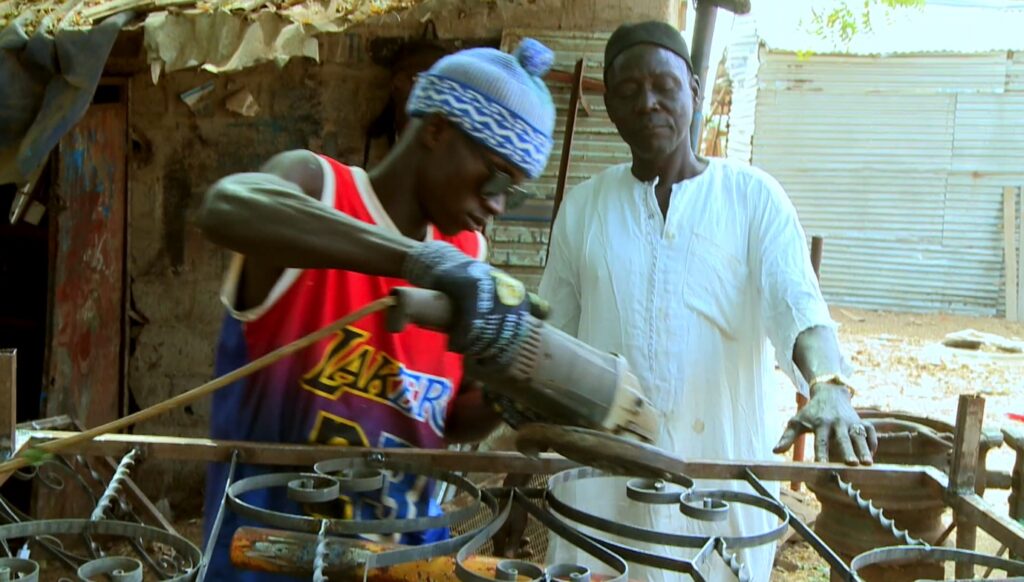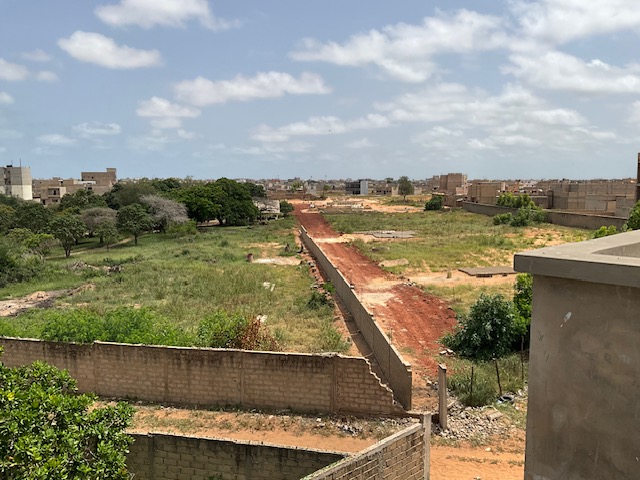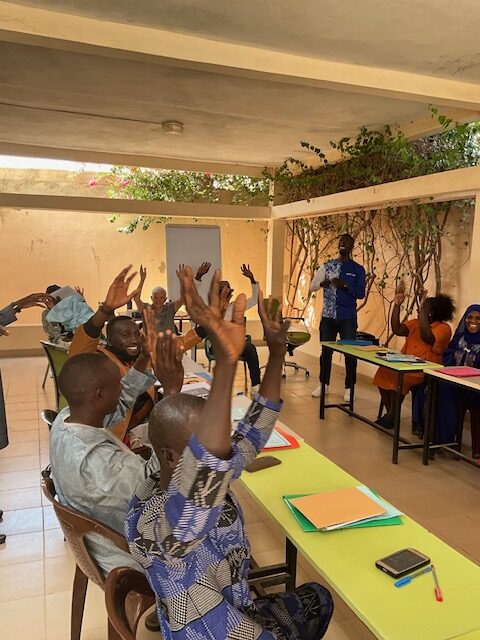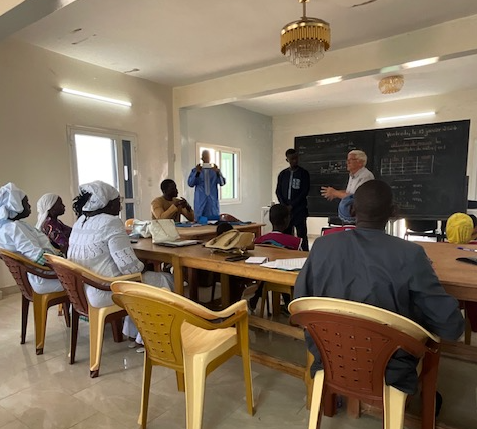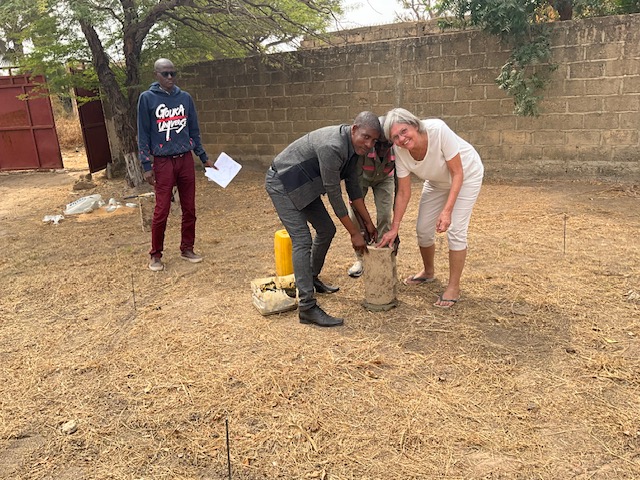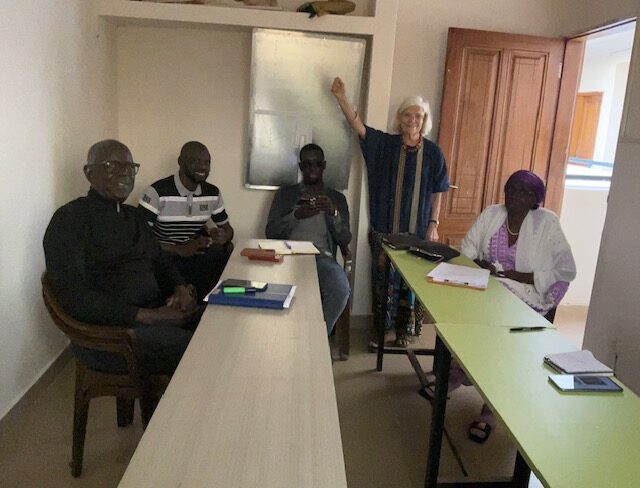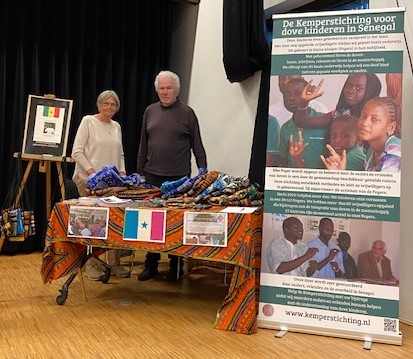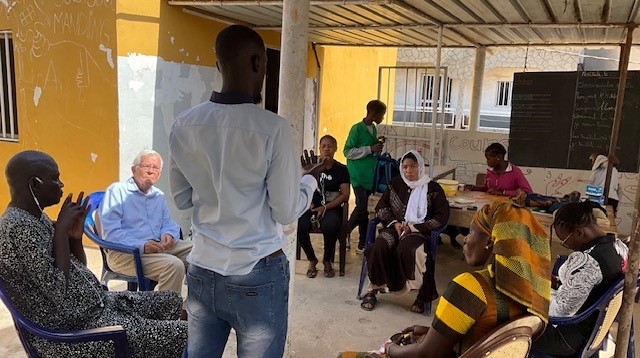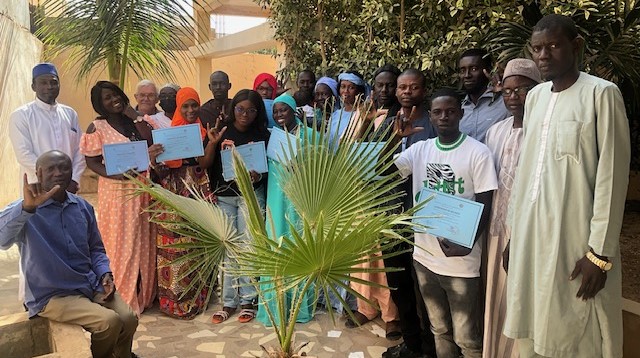Annual Activity Report of the Kemper Foundation 2024
Introduction
Presidential elections brought a new government to power in Senegal in April 2024. This provided an opportunity for the Kemper Foundation and AMCRE (our program coordinator in Senegal) to highlight our objectives and working methods with a revised edition of our brochure, in which, after 20 years of operational work, we can now also showcase results. Since 2003, we have launched 31 foyers for the deaf, 16 of which were operational this year. We have introduced a total of 87 sign language monitors (38% of whom are women). As a result, 870 deaf children (38% girls) in Senegal have now attended our foyers. We have their names and addresses. The majority now have an independent position in society. Around twenty deaf young people (former students of a foyer) completed an internship at a workshop in 2024. Our bottom-up strategy is effective and rewarding.
I. Progress of the Kemper Foundation projects
- Training deaf children
a) Sign language lessons
The 2023/24 school year began in most foyers (deaf training centers) on November 1st, ending 8 months later. There were 190 students, 64 of whom were girls, spread across the 16 operational foyers, 5 of which had two classes (beginners and advanced). While there are new deaf students (36), the number of deaf school leavers is higher (42). This is mainly because some students have completed their education and are starting to learn a trade, while at the same time the number of illiterate deaf children in the areas where the foyers operate is gradually decreasing. Of the total 190 students, 36 were new students. Literacy and sign language lessons were taught by 21 instructors.
Sign language lessons are also organized for the people the deaf children interact with. In 2024, these lessons were offered for the fourth year to 97 non-deaf people, including parents, friends of the deaf, and heads of the workshops where internships are conducted, as well as to some primary school students. This took place in more than half of all deaf foyers. There is sometimes collaboration with the primary schools near the foyers, for example, for pencils and paper, but this collaboration could be improved. Some principals have made a classroom available for these lessons to promote better communication between hearing and non-hearing students. However, the quality of such classrooms needs to be improved, and there is no guarantee that the assigned classrooms will be used for an extended period.
b) Monitoring visits
All foyers in and around Dakar were visited twice each by AMCRE staff. During these visits, the quality of teaching was monitored and, where necessary, the Deaf Parents’ Association was provided with advice and support. The monitors of the more inland foyers were monitored and supported through video calls (WhatsApp).
c) Training for the instructors
Two refresher courses for instructors are organized annually: one in Dakar and one inland. From January 15–20, 2024, a course took place at the Centre Daniel Grouès in St. Louis, where instructors from nearby regions were trained. Carla and Jan, members of the Kemper Foundation board, attended this training. A second training took place from December 16–24, 2024, in Dakar, attended by Jan. A total of 21 instructors were trained, traditionally funded by Schilde/GROS. The two training courses covered the following: revising existing training modules based on sign language, preparing student forms, the “pedagogy of following the class,” and working with a new training module; this year, for the first time, it focused on crafts and other professional activities. Parents and friends of deaf people were also invited to participate in the training courses. The course concluded with a test, and a “certificate” was awarded to those who passed. These trained monitors can be asked to train and support new volunteers. A new element of this year’s training was the focus on learning a trade. A second innovation was the introduction of physical education as an additional subject in deaf education – something that had begun in a number of foyers and clearly seemed to contribute to improving social interaction among students.
d) Collaboration with public schools near the foyers
This collaboration, important for promoting the integration of deaf children into hearing society, could be much better. Some foyers are occasionally visited by teachers from the surrounding area. This is far from sufficient.
e) Collaboration with the government and others
The new government brought about changes in the Ministry of Education, which at the time promised to prepare a new agreement (Protocol d’Accord) with the Kemper Foundation. Recognition of the work of Kemper Foundation/AMCRE, the amount of government support for the costs, and collaboration between public primary schools and deaf foyers were supposed to be key priorities of this agreement. Unfortunately, this has now been significantly delayed. Kemper Foundation/AMCRE is therefore focusing on strengthening the associations of parents of deaf people and, through them, approaching Municipal Services for possible support. Three parent organizations have thus secured support for the installation of electricity and a water well (Gandiaye); Gandiaye and Keur Madiabel have also each received three computers complete with audio equipment from the Ministry of (Tele)Communications and Informatics. ANAMO (Agence National de la Maison de l’Outil) funded the aluminum carpentry training of six deaf students.
Parent associations are facing a number of problems, such as: a) the increasing number of pupils, which entails additional costs, and b) the lack of a suitable place to teach/receive lessons. It is crucial that parent associations continue to raise awareness of their work and expand their network of technical and financial partners at the local level.
f) Teaching Materials
AMCRE regularly updates its teaching materials, ensuring they remain up-to-date and meet the needs of deaf students, also considering their future after completing the literacy course. New teaching materials were developed, focusing on trades that older deaf students might choose, such as metalwork, carpentry, blacksmithing, shoemaking, housekeeping, dressmaking, etc. A curriculum and accompanying teaching materials were developed and used in every foyer. Existing teaching materials from primary schools are also used, which will hopefully contribute to better recognition of the certificates deaf students can obtain at the end of the course.
g) Collaboration with the associations of parents of deaf children
AMCRE fosters dialogue with parents of deaf children. They consistently request more support for better support for their deaf children and their education. Assistance was also requested in obtaining legal recognition for the parent association, as well as more support for teaching and other school materials, and especially for the compensation of tutors, which most parent associations do not yet have the resources for themselves. In 2024, 16 parent associations received support from the Kemper Foundation for the compensation of these 21 tutors. Some parent associations received support at the local level, from the municipality or other donors (see also section e). Assistance with obtaining birth certificates is another request from the parent associations.
h) Work after Training
Nine of the 16 associations of parents of deaf children now support the post-literacy program. Forty-four older students were placed in workshops run by local artisans to learn a trade while receiving instruction in specialized sign language. AMCRE is currently compiling a statistical overview of these activities.
i) Monitor Remuneration
With the support of the RKWO, the Kemper Foundation finances the majority of the remuneration for the 21 current monitors through AMCRE. At the same time, AMCRE reminds the (16) parent associations that they should make the largest contribution to the monitors’ payments, in the interest of continuity. Unfortunately, in many places, it is still difficult for parent associations to afford this.
B. Better living with acquired knowledge
In Senegal and its neighboring countries, only 50% of children attend school, where they often fail to acquire relevant knowledge. This project aims to address this by promoting short courses on a specific topic of local relevance. It also promotes reading through village libraries housed in the learning hostels originally established by UNESCO clubs. The renovation of eligible learning hostels is being funded by the UCN with €5,500 initially for the Cherif Lo learning hostel (for details, see D).
C. Promoting Reading
After several years of successful implementation of this project, the administrators of the libraries in both towns (Diarere and Ndondol) encountered problems: some of the books borrowed in previous years were not returned. It is questionable whether the restocking of books should continue until the underlying problem is solved.
D. Strengthening the infrastructure (foyers and learning hostels)
With the UCN donation, Cherif Lo’s Club UNESCO has achieved the following:
- renovation of the central building dating from 1992;
- improved and tiled the restroom block, and repaired the wall surrounding the grounds; built a guardhouse;
- furthermore, office furniture was purchased for the center’s management.
II. AMCRE
- In September 2024, AMCRE submitted an activity plan with a budget for 2025, which was discussed and approved at the Council of State meeting of September 29, 2024.
- In 2024, AMCRE’s technical team consisted of two full-time staff members: the administrator (Nfally Sany Diatta) and the training and sign language specialist (Babacar Seck), supported part-time by sign language specialist François Manga.
- The AMCRE Board met on September 21, 2024, to consider expenditures incurred in 2023; to present a budget proposal for 2025 to the Council of State; and to discuss how to contact the new government.
- Composition of the AMCRE Board: 5 unpaid members: Babacar Fall (Chairman), Fatou Ndiaye (Secretary), Mamadou Hervé Fall (Treasurer), Félicité Salzman (Deputy Treasurer), Aliou Doumbouya (Communications Member); and two unpaid advisors: Jan de Bosch Kemper (General) and Honorine Fall (Accounts).
III. Friends of the Kemper Foundation
The list of Friends of the KS in France now includes about 20 individuals/families in France. Friends of the Kemper Foundation in the Netherlands (22) received a special information letter about the Kemper Foundation and its activities. In France and the Netherlands, the 42 friends together raised €1,732 in 2024.
IV. PR activities
- Newsletter: The Kemper Foundation Newsletter was published twice in 2024.
- The website, which was redesigned in 2023, was launched in November 2023. After an update and minor improvements and adjustments by board member Philippe with the help of Paul, Bert, and Maaike, it is now fully operational.
- Carla actively participated in two fairs in France, which resulted in new members.
- The new Kemper Foundation brochure/flyer was actively used and distributed by all board members.
V. Kemper Foundation Board Affairs
The board met on September 29, 2024, as is tradition, in Schilde, Belgium, at the home of board member Bert Schortinghuis, to discuss, in particular, the allocation of funds for the coming year to AMCRE. A sum of €46,879 was guaranteed by the Kemper Foundation for this purpose.
Donations from the municipality of Schilde/GROS (€2,325), RKWO (€7,500), and UCN (€5,500) were gratefully acknowledged.
Jan and Carla conducted field visits (St. Louis training and foyers in the surrounding area, plus Cherif Lo). Jan and Wilma made a second visit to Cherif Lo in early March. Jan participated in the monitor training from December 20-24 in Tivaouane Peuhl. Carla made her annual tour, also to Gandiaye, and subsequently to Ndondol and Diarère.
Board matters: Margot van der Velde (WFP Dakar) is appointed as an outposted board member in Dakar, to support Jan. The board composition remains unchanged.
The Kemperstichting is not yet recognized in Senegal; in 2024, Carla and Jan investigated how to achieve this.
VI. Finances 2024
This year, the Kemper Foundation benefited from favorable stock market prices, which significantly increased its value. As the overview shows, the Kemper Foundation was able to fulfill the financial guarantees it promised AMCRE without any problems. To fulfill these guarantees for 2025 as well, the Kemper Foundation will need to request a contribution from the Kemper Foundation. The overview shows that the Kemper Foundation has a sound financial base and can easily achieve its goals.
Overview of the ABN/AMRO Kemper account
| Kemperfonds | |||
| Value Kemper Fund of 31-12-2023 | € 430.801,13 | ||
| Value Kemper Fund of 31-12-2024 | € 489.422,00 | ||
| Jaaroverzicht bankrekening ABN/AMRO no NL54ABN0610929062 | |||
| Balance on January 1, 2023 | € 34.175,48 | ||
| Revenue in € | |||
| Contribution RKWO | € 7.500,00 | ||
| Contribution GROS SCHILDE | € 2.325,00 | ||
| Donation of friends Kemper Foundation | € 1.732,00 | ||
| Expenditure in € | |||
| AMCRE declarations | € 40.191,00 | ||
| Bank and transfer fees | € 256,44 | ||
| Website costs | € 246,84 | ||
| Chamber of Commerce | € 46,30 | ||
| Various | € 60,85 | ||
| € 45.732,48 | € 40.801,43 | ||
| Balance as of December 31, 2024 | € 4.931,05 | ||




